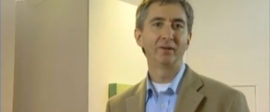R. Paul Stevens on Sacred-Secular Dualism - Worst Heresy of the Christian Church Worldwide (Video)
Video / External content not produced by TOW ProjectThis lecture by R. Paul Stevens is part of a series of videos on the theology of work available from Worldview Media.
Excerpt:
For Christians, the problem is that we are fatally fascinated with the extraordinary. On one side of a line there are Sunday things: other-worldly things, supernatural things, holy things, and spiritual things. On the other side of the line there are unspiritual things: human things, natural things, this-worldly things, and the things of everyday life.
This is the problem of dualism – that some things are sacred and some things are secular. It is the worst heresy in the Christian church worldwide.
For example, in the 19th century James Hudson Taylor founded the China Inland Mission. That was wonderful work. At the same time a French artist, Jean Francois Millet was producing beautiful images. Was Hudson Taylor’s work sacred and Jean Francois Millet’s work secular?
In the 1950s missionaries came to the south part of Korea. They did good work. But at the same time, an author by the name of John Ronald Reuel Tolkein wrote the famous book Lord of the Rings, and the children’s story The Hobbit. Which one is sacred, and which one is secular? Which work would the Lord have called, “Worthier” or “More sacred than the others?”
Here is the sacred-secular dualism. Church services are sacred. Company office are not. Quiet times are sacred, but eating, sleeping, and resting are secular. Prayer meetings are sacred, but political action is secular. Reading the Bible or witnessing are sacred, but reading the newspaper is secular.
Serving on a church board are sacred. But a number of you are homemakers. Listening to one of your children or to your spouse is secular. I was just with my daughter one hour ago. She had a very hard day at work on Friday. She was accused of things she didn’t do. And I listened. You know what? That’s holy. That’s holy work.
Giving money to a Christian mission or serving on a municipal committee or spending time with Christians – that’s holy. But what about spending money on clothing for your children, or spending time with a friend?
The problem is the tragic separation of Sunday and Monday. Church life is separated from ordinary life. Private life is separated from public life. Inner life is separated from outer life. And belief is separated from behavior.
Let me suggest something. Paul in his writings never said people go to church to worship. Paul believed that we are worshiping God all the time. I don’t think there’s a part-time option for followers of Jesus.
R. Paul Stevens joined the Regent faculty in 1987 as Associate Professor of Applied Theology and was named the David J. Brown Professor of Marketplace Theology and Leadership in 1999. During his tenure at Regent, Dr. Stevens taught courses on Marketplace Theology, equipping and empowering the people of God, and ministry and spirituality. In addition, he served the College as Academic Dean. Dr. Stevens’s primary focus in teaching and writing is equipping the whole people of God for leadership. He has taught and spoken at institutions all over the world, including Tyndale Seminary in Toronto, the Christian Studies Institute in Brazil, Fuller Theological Seminary in Pasadena, Biblical Graduate School of Theology in Singapore, and in Kenya for the Certificate in Ministry offered by Carey Theological College. Dr. Stevens was named Professor Emeritus of Marketplace Theology and Leadership in 2005 and continues to teach courses frequently at Regent. Dr. Stevens is a craftsman with wood, words, and images and has worked as a carpenter, a student counsellor, a pastor, and a professor. His personal mission is to empower the whole people of God to integrate their faith and life from Monday to Sunday. Dr. Stevens is married to Gail and has three married children and eight grandchildren. He and Gail have resided in Vancouver since 1969 and travel to all continents to teach, learn, and contribute.

.jpg)









.jpg)
